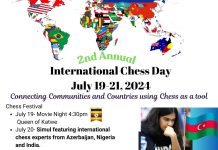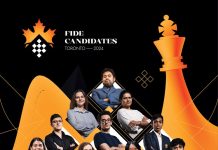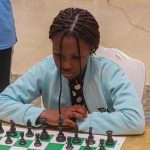Rumour has it that the attraction of chess stems from its appeal to the intellect — the player is in control — and luck plays no role. If so, how to explain blunders and mistakes and players’ reference to luck. RUNE VIK-HANSEN explores factors beyond our control favourably influencing the outcome, debunks a few myths about chess playing and aspires to show how luck in chess differs from “lottery luck.” With luck a possible part of chess, what might be the implications? Can the human ego handle the blow? Will it reduce the status of the royal game? Will it deepen our understanding, perception and appreciation of chess and ourselves or will we (GASP!) quit chess? Or…might luck even come to our rescue in our darkest moments?
.jpeg)
“Diligence is the mother of good luck.”
– Benjamin Franklin
Perhaps only rivaled by the question if chess is a sport, athletics or just a game (Vik-Hansen, 2013) the role of luck in chess seems to captivate and intrigue players, non-players, professionals and amateurs alike.
The mere possibility of luck seems to contradict and undermine our perception of chess as a rational activity where skills and proficiency alone, in contrast to say dice or card games where luck is assumed ‘to even out in the long run’, are supposed to decide the outcome. In other words, chess is perceived as an activity where the players control the chain of events to such an extent that by training and effort we improve and thus control the result or outcome.
However, the notion of no luck in chess is, perhaps surprisingly, inextricably linked to a notion of free will, an idea of control, which yet further is linked to a concept of consciousness and a conscious I. Therefore, our first task is to clarify what sort of agency, or control, would exclude luck from playing a part in chess.
Human agency might be summarised as (1) action, (2) thinking and (3) perception, and we start off with action.
Human Agency — Action
Regarding agency, much debated is the mind/body duality where the problem is to account for how mental states, or properties, like seeing colours, experiencing pain, tasting or smelling something, can cause physical limbs (‘arms and legs’) to move—a duality that might be summed up in two hitherto unreconciled principles:
- The causal closure of the physical domain, which states that every physical effect or event has a physical cause. In a physical system, like a human body, only physical causes can ‘move the meat’ (Kim, 1993, p. 280; Vicente, 2006, p. 150)
- The causal relevance of the mental domain, where the question is how mental properties or states can ‘move the meat.’
A problem with the term ‘conscious’ when describing actions [consciously + verb], is ambiguity, as the term may refer to common/shared knowledge, censorship, introspection, personal identity (the I as the totality of all our mental states and the answer to what or who owns these mental states) (Gundersen, 2004, pp. 8-11) or free will as an ability to act freely and unconstrained.
Examples from chess discourse, chess literature and the chess press might lure us to think that consciousness pervades all mental life but far from it because we cannot be conscious of what we are not conscious of (Jaynes, 2000, p. 23). Jaynes (2000, p. 23; Nørretranders, 1999, p. 174) compares our impression of the ubiquitousness of consciousness with a flashlight searching for something in a dark room that is not lighted and has to conclude, since there is light in whatever direction it turns, there is light everywhere.
Despite huge time gaps when the flashlight is not on, to the flashlight itself it seems it has been on all the time, and similarly, we are conscious far less of the time than we think because we are not conscious of the gaps—the time—we are not conscious of (Jaynes, 2000, p. 24).
As with the blind spot (Jaynes, 2000, p. 25; Nørretranders, 1999, p. 180), in the field of vision we do not notice—the optically insensitive region on the retina void of visual cells—both because the spot is located on different places in the right eye and the left eye and our brain and visual experience ‘fill in’ the gaps, consciousness fills in the time gaps in the stream of consciousness and gives the illusion of continuity (Jaynes, 2000, p. 25)
Since free will hardly can be thought independently of consciousness and a conscious I, it begs the question if a non-physical consciousness could cause physical limbs to move, and if so, why not ask paralysed patients in wheelchairs to use their free will and make a conscious decision and just get up? Do we blame the paralysed for being weak-willed?
However, assumed consciousness cannot initiate actions or physical movements, neurophysiologist Benjamin Libet (1985), in the wake of his experiments in the early 80s, suggested consciousness, even if not the initiator, still could lay down a veto, depending on how disciplined it is.
How often have we not caught ourselves saying ‘I was about to say/do…but caught myself’, where our mind has initiated an impulse for us to say or do something but we stop, or veto the impulse from running to action. Because we cannot be conscious of what we are not conscious of and free will hardly can be thought independently of consciousness and a concept of a conscious I, neither can we know how much of the time free will is not at work; we only know when it is at work; during the veto.
Thinking and perception
Actions are one thing, but what about thinking? Can we think ‘what we want/will’?
In the early twentieth century, Marbe (2012/1901) and Watt (1906) demonstrated that thinking and judging, the supposed hallmarks of consciousness, are not conscious at all (Jaynes, 2000, p. 38). We do our thinking before we know what we are to think about. We do not know what we are thinking until we’re thinking it and only its preparation, materials, and end result are consciously perceived (Jaynes, 2000, p. 39).
Could we (consciously) select the best preparations and best materials for the actual thought processes, we would control the thought processes as well as the end result. In chess, thinking manifests itself in cognitive activity as diverse as assessment, analyzing and calculating. We are, of course aware of or conscious of the fact that we are assessing a position, analysing or calculating certain moves or variations but the processes are all subconscious, since, with access to all the (perfect) information right in front of us, we would not misjudge a position, analyse or calculate poor moves or bad variations ‘on purpose.’
Since the 1950s it has been known that only a fraction (1-40 bits) of the 11,121,000 bits of the information flooding through our sense organs makes up a conscious experience (Zimmerman, 1986), and neurophysiologist Hans H. Kornhuber (1988) states:
Thus, there is a great deal of information reduction in the nervous system. Most information flow in the brain is, by the way, unconscious. The soul is not ‘richer’ than the body; on the contrary, most of the processing in our central nervous system is not perceived. The unconscious (which was discovered and elucidated long before Freud) is the most ordinary process in the nervous system. We just look at the results, but we are able to direct the focus of attention.
The brain, and not we consciously, controls the influx of information, selects and organises the relevant information units into a coherent conscious experience and if we could direct our focus at will, how to explain errors, mistakes, blunders, mishaps or slip-ups? The phrase ‘having our attention or interest caught’ implies that something outside our consciousness does the catching. If we could direct our focus at will, why not focus on what we should focus on? Homework, chores, poverty, trapped knights and rooks en prise…? (Parenthetically speaking, how come we let our knights get trapped or we leave our rooks en prise if we at will could direct the focus of our attention?)
Delineating human agency into action (the veto), thinking and perception, when our veto depends on how disciplined our consciousness is, our actions may be said to have three possible sources: (1) Intracerebral (brain/mind alone), (2) external (impressions/information solely from outside) or (3) interplay between internal and external factors where we, because we cannot get ‘behind’ our consciousness, as it were, are in no position to distinguish, isolate or separate different types of causes from one another. We are not conscious of the preceding causes leading up to the moment of action we are conscious of.
However, our delineation of human agency suggests that the brain by subconscious physical processes plays chess when triggering moves, whereas we (consciously) play chess by the veto, i.e. when aborting or stopping our brain’s suggestions.
Luck
Winning the lottery as an example of luck might be considered paradigmatic, caused by a coinciding of several causes/circumstances/events, intracerebral as well as external:
- Getting up in the morning
- The idea of playing the lottery occurring to us
- Playing via the internet (in the comfort of our own home) or at the local store
- Picking out a pre-filled ticket or choosing the numbers ourselves
- Handing in the ticket
- A working lottery machine
- The initial conditions of the balls
- Air flow
- Air pressure
- The trajectories of the balls
- The duration of the drawing
- The way the balls bumping into one another or the walls of the machine
(Chance in lottery does not consist in the drawing but in the picking of the numbers, as the drawn numbers do not occur by chance, i.e. are uncaused, but result from causes beyond our control.)
We may now summarise our findings so far:
(1) Actions subconsciously initiated, (2) the information units pouring through our senses, (3) the mind’s processing of the information, (4) the selection and organization of information into a conscious experience and (5) external causes/circumstances resulting in our winning the lottery, suggest a tentative and general definition of luck and unluck:
- Luck: unpredictable. favourable outcome(s) where we neither control the causes at work or how they work together (certain outcomes presuppose certain events) and an ability not to abort impulses leading to unpredictable, favourable outcomes (picking the right lottery numbers and not handing in the ticket) and to abort ill-conceived impulses leading to unfavourable outcomes (blunders in chess).
- Unluck: (unpredictable) unfavourable outcome(s) where we neither control the causes at work nor how they work together and are unable to abort the chain of causes (often in the shape of ill-conceived impulses (blunders in chess).
Case in point: We avoided the avalanche because we missed the ferry when our friend called to tell us he had won the lottery on the same day his wife said she would divorce him after his old parrot for the umpteenth time bit her in her wooden leg.
However, chess appears essentially different from playing the lottery but if in control, how to explain:
- Time trouble?’
- Nervousness?
- Spending time?
- Poor/bad moves?
- ‘Irresponsible play?
- Our intuition fails us?
- Untimely draw offers?
- Poor judgment/assessment?
- ‘Falling asleep’ during a game?
- Blunders, errors and mistakes?
- Unexpected possibilities/chances?
- How we mess and screw things up?
- The feeling ‘that something is at stake’?
- Lapses or collapses during tournaments?
- Missing tactical shots/combinations/wins?
- How things ‘get out of control’ or ‘turn out’?
- The relevance of/need for inspiration/intuition?
- Following or embarking upon the wrong plan?
- Declining draw offers we should have accepted?
- Why stronger players (‘on paper’) lose to or draw weaker players (‘on paper’)?
- Forgetting variations, preparations, when the round commences etc.?
- Unfortunate off-the-board circumstances (Chess playing is not isolated from but part of an integral whole called ‘life’)?
- Improvement (How to improve if the better player always wins? (Agdestein, 2016; Grønn as quoted in Fosse, 2017, ‘Det beste og verste med sjakk’ [The best and worst with chess], para. 3)?
- Competing on equal terms, since we come to the board with different qualifications: mental as well a physical, preparations (theoretical, physical etc.), different off-the-board circumstances etc.?
If mistakes are not made ‘on purpose’ but still happen, are we suggesting our limbs move without us knowing?
If the better player (‘on paper’) always is in full control, always wins and luck plays no role:
Victory against weaker players (‘on paper’) would be a forgone conclusion, a matter of course, so why play at all (Beyond ‘getting the formalities out of the way’)? Unless the players are equally rated, will the games be called off?
We would never end up in worse positions against weaker players (‘on paper’) in the first place.
There is no need for happiness, rejoice or celebration when winning games, tournaments and matches, since the result, again, would be a forgone conclusion and a matter of course. (Imagine a deadpanned reaction like, ‘Hold your applause. Of course I won, I’m better.’)
However, applause, celebrations, congratulations, high-fives, rejoice, smiles, and feeling of relief after winning or drawing lost games against equally strong (‘on paper’) or weaker players (‘on paper’) and games against lower rated opponents still being played, are all visceral testimony to a realisation that there might be gaps and glitches in perception and neural networks; the result or outcome is not a given or foregone conclusion, as ratings per se only measure past achievements. The only possible praise or compliment appears to be a measured: ‘Good for you’, when we cannot take credit for our achievements or anything but appreciate we got to experience the pleasure of success.
Luck in Chess — Definition
If chess moves and lottery numbers as well result from a coinciding of intracerebral and external causes/circumstances beyond our control, how does playing chess differ from playing the lottery?
The boundaries of human agency and control summarised as (1) action, (2) thinking and (3) perception, and our veto depending on how strong or disciplined our consciousness is, distinguish luck in chess from ‘lottery luck’ as:
- Unpredictable, favourable outcome(s) of causes and circumstances beyond our control, internal as well as external, but not in the lottery sense of the word as the brain/mind as a physical system is more stable/consistent than the drawing of lottery numbers, yielding different numbers every week.
- Ability not to abort impulses leading to unpredictable, favourable outcomes and to abort ill-conceived impulses leading to unfavourable outcomes (blunders). (If we did control the veto-moment, we would never let ill-conceived impulses run to action.)
- Happens over the board (OTB-luck) when gaps and glitches in our control, i.e. time gaps we are not conscious of, provide our opponents with chances and possibilities we later come to call ‘luck’, since, if conscious (no gaps), we would in not ‘on purpose’ present our opponents with such chances and possibilities the first place. (These gaps, paradoxically, do not lend themselves to dating (since we are not conscious of them) but are manifested or expressed by our moves.)
If we were in control of both internal and external causes and circumstances underlying our moves, the better player (‘on paper’) would always win against weaker players (‘on paper’) as a matter of course but, as we know, the better player does not always win and our definition may explain why: Better players have full control most of the time, no control some of the time but never full control all the time.
When better/stronger players (again ‘on paper’) do not have control, there are gaps or glitches in their perception (they see the board but don’t perceive it (Vik-Hansen, 2016)) or in the causal nexuses or causal chains in their physical neural network system (a.k.a. the brain/mind in the shape of processing the information) and in these gaps and glitches precisely lies weaker players’ (‘on paper’) chance for improvement by defeating or drawing the better/stronger player.
We might say that one causal network (the weaker player) exploits the gaps and glitches in another causal network but where neither player consciously or volitionally controls the causal neural network, neither their own nor their opponent’s.
(In the contention that the better player always wins, there is a logical trap: If a weaker player (‘on paper’) in a single game defeats the stronger player (‘on paper’), the ‘weaker’ player indeed turned out better. In other words, if the better player (‘on paper’) does not always win against weaker players (‘on paper’) they are by definition not better. How many games are better players (‘on paper’) required to win against weaker players (‘on paper’) to be recognised as generally better?)
Luck defined as gaps and glitches in perception as well as causal neural networks and unpredictable, favourable outcome(s) of causes and circumstances beyond our control, internal as well as external suggests, that luck in chess is not limited to play over-the-board but applies to (away-from-the-board) analysis or situations as well, illustrated by the following snippets from Kasparov and Anand:
- Kasparov (2003, p. 208) on Lasker’s 59th move against Rubinstein (St. Petersburg, 1914): ‘The last critical position in this amazing game. Here, with the help of a computer, I was fortunate enough to discover something.’
- Anand (2012, p. 187) commenting on Black’s 18th move in the 9th match game against Kasparov in their PCA World Championship match in 1995: ‘I was surprised that he was prepared to go down this line [following a Scheveningen Sicilian from Cuijipers-De Boer, Dutch Championship, 1988] so blithely….It was lucky I didn’t know about this game, or I might have abandoned the whole line!’
Our definition suggests why luck and objectivity (IM Grønn as quoted in Fosse, 2017, ‘Det beste og verste med sjakk’ [The best and worst with chess], para. 3) are not mutually exclusive: Objectivity merely signifies that moves and variations in principle, impartially and universally can be tested independently of individual subjectivity bias caused by perception, imagination, emotions, preferences or convictions, not that we control the unfolding of the events.
Along the same lines falls Valaker’s rejection of luck (Valaker, 2010) because chess is supposed to be a battle between brains/minds. However, dismissing luck ignores the human factor former world champion Lasker (1868-1941) encourages us to take into account when stating chess being a battle between brains/minds, as the battle does not imply our controlling the processes in the brain/mind.
Deserving Luck
In light of our analysis and definition of luck in chess, the axiom often ascribed to Capablanca (Winter, 2016), ‘The good player is always lucky’, may be said to be ‘playing for three results’—(1) nonsense, (2) tongue in cheek and (3) deep insight—and may serve to illustrate Italian programmer Alberto Brandolini’s (2013) Bullshit Asymmetry Principle (or Brandolini’s law), stating that ‘the amount of energy needed to refute bullshit is an order of magnitude bigger than to produce it’, (he principle can be sharpened by differentiating between different types of nonsense or bullshit: some types taking longer to refute than others) captured also by the old proverb, ‘a lie is halfway round the world before the truth has got its boots on.’
If a good player is always lucky, we’re not talking luck and although the contention ‘there is no luck in chess’ are only six small words, it takes quite an amount of analysis and elaboration to prove it problematic, if not flat out groundless.
Grønn (as quoted in Høiby, 2016) praises Carlen’s queen sacrifice 50.♕h6+ against Karjakin (New York, 2016), as something that happens to people who deserve it, as a reward for good play, and according to Hillarp-Persson annotating Carlsen-Nepomniachtchi (London Chess Classic, 2017), ‘… luck usually comes to those who deserve it’, which opens for worthy and unworthy recipients of luck. However, since the chain of causes leading up to the luck moment is beyond our control, luck is something we do not deserve but merely something that happens us ‘(Good for you’).
Conclusion
Accepting and coming to terms with the fact that luck indeed is an inherent component of chess and that we do not possess the control traditionally ascribed to conscious agency, may, as the presence of luck grants us adequate space to distance ourselves from our misery and cushion the blow, help us lower the bar of expectations and help us deal better with defeats and better cope with tension.
Concluding our analysis, we bid the reader farewell with the winged words of late Dutch grandmaster Donner (2006, p. 86):
Chess is and will always be a game of chance. ‘How now, sir?’ I hear you cry. ‘Isn’t it precisely the best and noblest aspect of the game of chess that the chances are equal and that the players control everything themselves?’ ‘Yes, gentlemen, quite, but who can control himself?
Source: chessbase.com















